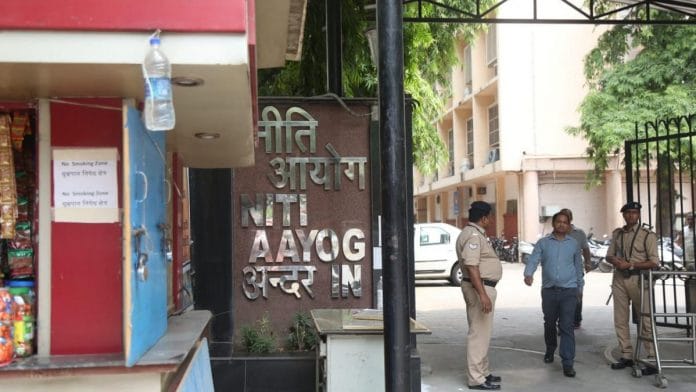New Delhi: In a bid to enhance communication between policymakers within the government and civil society, the NITI Aayog has decided to form groups of experts, which would include leading think-tanks, academics, universities, NGOs, etc. across different sectors, ThePrint has learnt.
According to officials with knowledge of the new plan, all the verticals in the NITI Aayog — it is divided into almost two dozen sectoral verticals — have been asked to prepare a list of experts for their respective areas this week, which would be finalised by top officials of the Aayog in the coming days.
“It is felt that while there are formal, established channels of communication within the government, a more institutionalised way of communication with the civil society needs to be established in the NITI Aayog since one of the key mandates of the Aayog is to collaborate with experts from outside the government,” an official said.
“Each vertical has been asked to shortlist about 20 experts, think-tanks, etc…These expert groups will probably be meeting every quarter of the year.”
ThePrint approached NITI Aayog spokesperson Dhiraj Singh for a comment through phone calls and text message, but did not receive a response until the time of publishing this report.
Groups of experts
Groups of experts are being formed for sectors like agriculture, energy, health, human resource development, public-private partnership, science and technology, land and water resources, which the NITI Aayog would routinely consult on key policy issues, the official added.
Two of the key objectives of the NITI Aayog are — “to provide advice and encourage partnerships between key stakeholders and national and international like-minded think tanks, as well as educational and policy research institutions”, and “create a knowledge, innovation and entrepreneurial support system through a collaborative community of national and international experts, practitioners and other partners”.
As of now, the groups of experts have been restricted to national experts, universities and think-tanks alone. However, the Aayog is also considering to engage international not-for-profit organisatons such as Bill & Melinda Gates Foundation, etc.
Another official said the NITI Aayog forms committees of experts to work out the details and pros and cons for several projects. “For example, to examine the proposal of ‘One Nation, One Health System’, there is a committee in the NITI Aayog, which includes doctors and public health experts from across the board…So, on the same lines, it has been decided that permanent groups of experts will be formed, which would act as a constant bridge between the government and the civil society.”
Also read: Niti Aayog at 6 — some ideas too ‘ambitious’ but Modi think tank has many reforms up its sleeve






